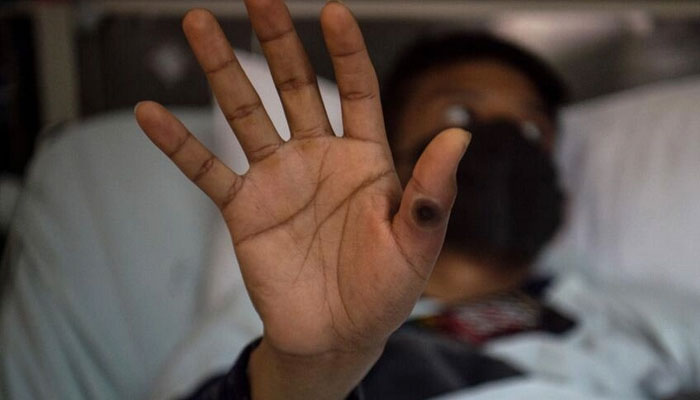Have we learnt nothing?
Upsurge in cases and deaths led WHO to declare a public health emergency of international concern in August
It has only been about two years since most countries put Covid-19 in their rearview mirror and the world is already grappling with another global pandemic. Mpox has spread across borders at a rapid pace this year, with the US Centres for Disease Control saying that the virus has caused over 100,000 cases in 122 countries, including 115 countries where the disease was not previously reported. The upsurge in cases and deaths led the WHO to declare a public health emergency of international concern in August. While the majority of cases are concentrated in Africa, the virus has spread to Europe and Asia, with the virus reaching Pakistan last month and India recording its first confirmed case earlier this month. As of writing, there are six confirmed mpox cases in Pakistan. Mercifully, the country is yet to confirm any deaths due to the disease and it is hoped that things will not reach that stage. In this regard, it is encouraging to hear health experts claim that the world is in a much better position to tackle the ongoing mpox epidemic due to the lessons learnt from the Covid-19 pandemic.
“Those learnings cascaded into specific instruments that are now coming into play” against mpox, according to former health minister and current CEO of Gavi, the Vaccine Alliance Dr Sania Nishtar. Aside from proper disease monitoring, surveillance and containment measures, one of the most important lessons for developing countries was how damaging the reality of vaccine inequality could prove to be. As wealthier countries stockpiled vaccines, in many cases buying doses that would never be used and went to waste, poorer countries like Pakistan were left short of key life-saving drugs. This time around, Gavi has already established a $500-million First Response Fund in June, designed to make cash rapidly available for vaccines during health emergencies, and has already entered a deal with Danish drugmaker Bavarian Nordic to secure 500,000 doses of its MVA-BN mpox vaccine for use in African countries hit by the epidemic.
Having cash on hand to secure vaccines once they become available is extremely important and it is encouraging to see organizations working to ensure that countries like Pakistan will not be left hanging this time. However, the country is also still struggling with more fundamental problems like detecting the infected at key entry points. We saw during Covid how even one missed case or patient could become a super-spreader, leading to dozens if not hundreds of additional yet preventable cases. The technical working group on mpox (TWG) has also said that surveillance at all other points of entry and airports other than Peshawar is very poor. While Pakistan may be able to count on more help this time to secure crucial aid like vaccines, there is simply no substitute for health authorities ensuring that cases are detected and isolated in a timely and appropriate manner. Even with vaccines, failing such basic steps could cause damage in terms of lives lost and health emergencies that could otherwise have been avoided. The country’s struggle with such basic preventative measures makes one wonder whether local health authorities absorbed any lessons from Covid-19.
-
 Lewis Capaldi Sends Taylor Swift Sweet Message After 'Opalite' Video Role
Lewis Capaldi Sends Taylor Swift Sweet Message After 'Opalite' Video Role -
 Sarah Ferguson Joins Andrew In ‘forcing’ Their Daughters Hand: ‘She Can Lose Everything’
Sarah Ferguson Joins Andrew In ‘forcing’ Their Daughters Hand: ‘She Can Lose Everything’ -
 'Bridgerton' Author Reveals If Actors Will Be Recast In Future Seasons
'Bridgerton' Author Reveals If Actors Will Be Recast In Future Seasons -
 50 Cent Super Bowl Ad Goes Viral
50 Cent Super Bowl Ad Goes Viral -
 'The Housemaid' Lifts Company's Profits: Here's How
'The Housemaid' Lifts Company's Profits: Here's How -
 Michael Douglas Recalls Director's Harsh Words Over 'Wall Street' Performance
Michael Douglas Recalls Director's Harsh Words Over 'Wall Street' Performance -
 Henry Czerny On Steve Martin Created Humor On 'Pink Panther' Set
Henry Czerny On Steve Martin Created Humor On 'Pink Panther' Set -
 Lady Victoria Hervey: Andrew Mountbatten-Windsor's Ex-girlfriend Proud Of Being On Epstein Files
Lady Victoria Hervey: Andrew Mountbatten-Windsor's Ex-girlfriend Proud Of Being On Epstein Files -
 Huawei Could Revive Chip Technology If US Lets Guard Down, Intel CEO Says
Huawei Could Revive Chip Technology If US Lets Guard Down, Intel CEO Says -
 Dolly Parton Created One Of Her Iconic Tracks With Acrylic Nails?
Dolly Parton Created One Of Her Iconic Tracks With Acrylic Nails? -
 Parents Alarmed As Teens Form Emotional Bonds With AI Companion Chatbots
Parents Alarmed As Teens Form Emotional Bonds With AI Companion Chatbots -
 Denzel Washington Surprises LeBron James
Denzel Washington Surprises LeBron James -
 Cillian Murphy's Hit Romantic Drama Exits Prime Video: Here's Why
Cillian Murphy's Hit Romantic Drama Exits Prime Video: Here's Why -
 Paris Hilton Reveals What Keeps Her Going In Crazy Schedule
Paris Hilton Reveals What Keeps Her Going In Crazy Schedule -
 Deep Freeze Returning To Northeastern United States This Weekend: 'Dangerous Conditions'
Deep Freeze Returning To Northeastern United States This Weekend: 'Dangerous Conditions' -
 Inside Dylan Efron's First 'awful' Date With Girlfriend Courtney King
Inside Dylan Efron's First 'awful' Date With Girlfriend Courtney King




